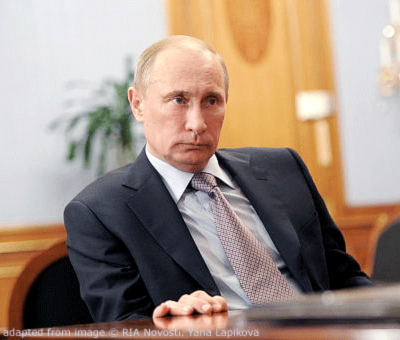Putin Views World as His TV Portrays It – and Himself as Russia’s Savior Not Its Problem, Davydov Says

(Paul Goble – Window on Eurasia – Staunton, November 19, 2018)
Most commentaries on Vladimir Putin are based on the assumption that he views Russia and his role in it in much the same way as his critics, with Russia beset by many problems and himself one of them, Ivan Davydov says; but that is almost certainly incorrect. Instead, he views Russia as doing well and himself as the country’s savior.
Unless that is understood, the New Times commentator continues, it is impossible to understand why he acts as he does or why he fails to act in response to challenges that others see but he by all indications does not. And to understand him, one must recognize that he is “the model viewer” of Russian television (newtimes.ru/articles/detail/172792).
That is, Davydov continues, the Kremlin leader accepts as true what television presents; and television presents as true what he wants to believe in the case, a vicious circle that he is part of rather than, as all too many assume, something he puts out for others but in fact understands as false because he stands above and outside of.
The main “theses” of Moscow television are well-known, the commentator says. “The motherland is surrounded by enemies and at their service are internal enemies, ‘the so-called opposition.’ The enemies are evil, they want to destroy Russia because for them Russia” is an irritant since it “preserves the healthy values which the West has long ago lost.”
Further, its theses include the notions that “Around Russia is hell and chaos: in Europe, immigrants, gays and other liberals” dominate the scene,” for example. But “on the other hand, Russia under the wise leadership of Vladimir Putin is flourishing … and for citizens here, it is a paradise or almost a paradise and with each day it is becoming a happier place to live.”
Many would like to believe that “the tsar” understands that this isn’t the case even if he wants his people to believe it. But there is no evidence for that conclusion, and there is a great deal of evidence that the reverse is true, that the president believes and acts upon exactly what his television puts out.
Moreover, Davydov continues, “the president conducts himself not simply as a conscientious consumer of the propaganda pudding. Everything is even sadder: he looks like the old woman who, having heard a bit of bad news, transforms it into a long story about the approaching and inevitable end of the world.”
He has done this again and again, taking snatches from Russian television ranging from reports that someone fighting against Russia in Ukraine spoke English and that the poisoners of the Skripals were private persons and expanding them into narratives that the English were fighting in Ukraine and that Moscow had nothing to do with the latter.
That pattern forces one to “the obvious conclusion” that Putin either believes exactly what his television says or doesn’t bother to consider what he says in expanding upon it. “It is still unknown which of these possibilities is sadder for the country.”
But of course, there is an important difference between the old woman spreading expanded rumors and the president of the Russian Federation. “The old woman is a view and only that. But the president is not simply a participant: he is a creator of that reality about which the television tells him and her.”
And for such a man, it is difficult not to believe in one’s own mission and that he is chosen by God but of course not by the people, if the media “tells you about your greatness day and night.” It is perhaps no surprise that his head is turned, especially because “Putin in this scheme is the supreme priest of the abstract state” Vladislav Inozemtsev talks about.
But such an identity between what television says and what Putin believes has another consequence as well, Davydov continues. It explains why Putin constantly seeks to deceive the leaders of other countries. For him, “this is simply a means to show simple people, even those highly placed,” that he is of “a different kind and calling” who can act differently than others.
Consequently, the commentator says, “if we ask what Putin hopes for, the answer is the following: Putin places his hope in god. In the god which chose him for the defense of the abstract state. Strictly speaking, this state is his god. And that is really frightening” if one reflects upon it for a moment.
If Putin were someone who was merely duplicitous, it would be possible to negotiate with and perhaps even reach agreement. But with someone who has become “the supreme priest of his own sectarian cult,” Davydov says, there is no such opportunity. “You are either bow down before his divinity or you are his enemy.”
And he has in this situation, “the OMON, the army and the nuclear button.”
Davydov might have pointed out that other leaders of major countries sometimes fall into the same trap even if they have a greater range of information to choose from in principle. They may choose to listen only to those media outlets that echo back what they believe and thus amplify their own views about themselves.
And they too may create a kind of cult with their listeners, one in which the leader as he himself believes is special, beyond the usual kind of assessment and criticism, and to be worshipped not because of real successes but because of his willingness to rely on this distorted mirror of reality and even to lie, thus showing himself to be of a different order than others.
[Article also appeared at windowoneurasia2.blogspot.com/2018/11/putin-views-world-as-his-tv-portrays-it.html]
